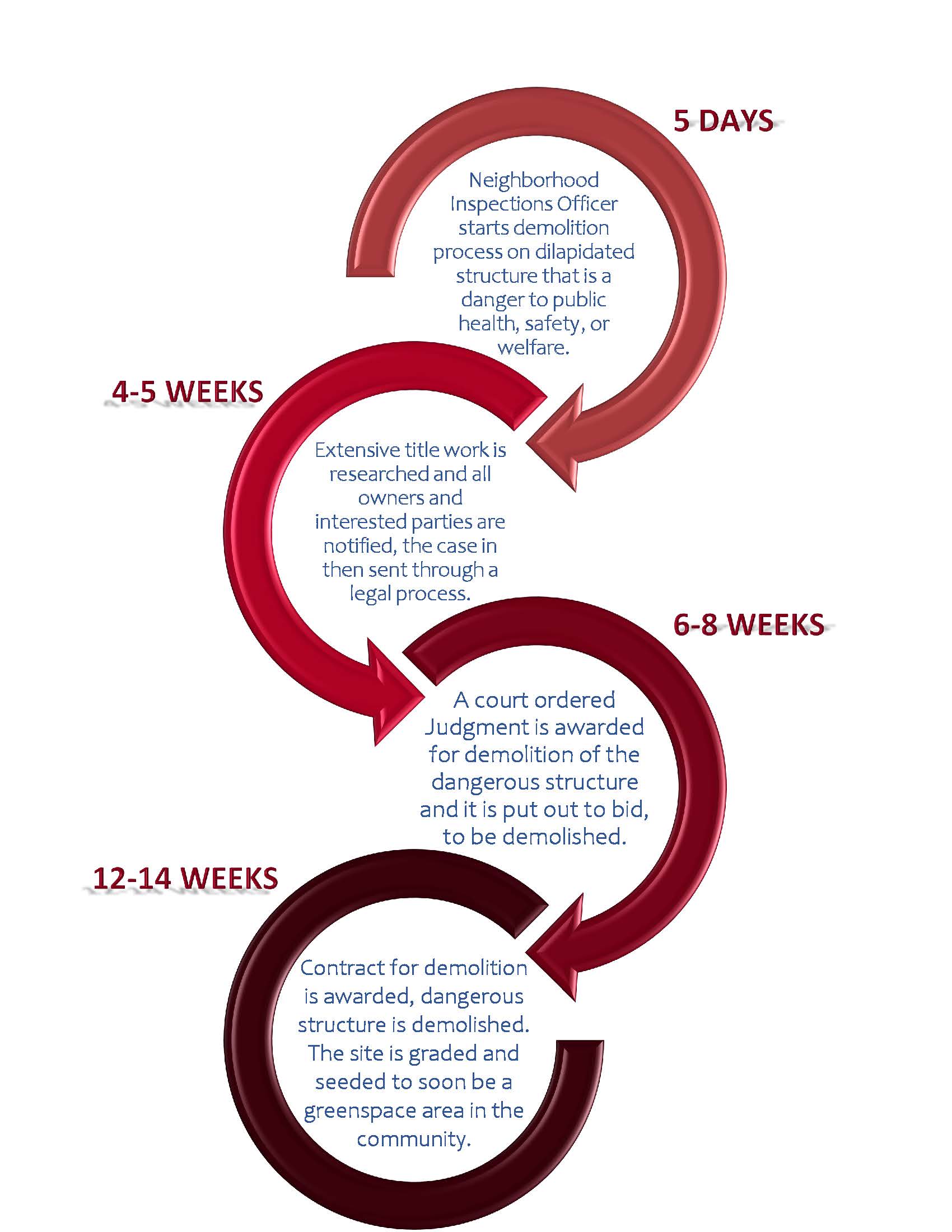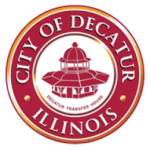Page Quick Links
- What is Code Enforcement?
- Mission
- Goals
- Problems/Complaints Handled
- Contacts
- Demolitions
- Frequently Asked Questions
What is Code Enforcement?
The Neighborhood Inspections Division, of the Economic & Community Development Department, addresses items in the community such as housing violations (abandoned, vacant, neglected, weather damaged structures), and Environment violations (derelict vehicles, trash and debris, garbage on lots/properties).
Neighborhood Inspections staff works closely with citizens and neighborhood groups to familiarize them on city ordinances and help them monitor their own neighborhoods for downturn or blighted properties.
Code Enforcement is a necessary tool to preserve City of Decatur neighborhoods and is critical to our community revitalization efforts.
Cases that are not abated (corrected) within the specific time frame, may be taken to Macon County Circuit Court or the city’s Administrative Court for adjudication.
Mission
“Community Revitalization is the implementation of intentional efforts that are likely to lead to measurable increases in access to employment, living wage jobs, healthcare, supportive services, community amenities, transportation, quality and affordable housing stock.”
Source: Illinois Housing Development Authority
Goals
- Demolition of Blighted properties
- Removal of Abandoned Vehicles
- Trash and Debris Nuisance
- Inform, Educate, Build Trust with Citizens
Problems/Complaints handled by Neighborhood Inspections
Environmental Problems – Chapter 48 & 49
- Worn out, wrecked, abandoned, or inoperative vehicles on private property
- Old furniture or interior furniture on property
- Appliances on the outside of the residence
- Placing of garbage on the ground instead of approved garbage containers with lids
- An open and hazardous well, cisterns, holes, pits or abandoned excavation
- Old pools containing stagnant water
- Trash and debris: brush, trash piles, old bricks, scrap metal
- Weeds or grass in excess of 10 inches
Housing or Building Problems – Chapter 70
- Deteriorating: roofs, walls, floors, foundation & porches
- Dangerous electrical wiring
- Inoperable or inadequate plumbing
- Living without utilities: water, gas, or electricity
- Unsanitary conditions
- Unsecured properties: open doors or broke out windows
- No heat source
Garbage Service Problems – Chapter 56
- Problems/questions with your hauler
It is important to Know your Code Inspector for your Neighborhood
To find out who your Code Inspector is click here for a link to a GIS Map.
Neighborhood Inspections Staff:
Neighorhood Inspections Manager
Michael Snearly
217-424-2783
msnearly@decaturil.gov
Administrative Assistant
Marissa Weybright
217-424-2783
mweybright@decaturil.gov
Inspectors
Tobias Welch (NW District)
217-450-2375
twelch@decaturil.gov
Danny Hoult (NE District)
217-450-2345
dhoult@decaturil.gov
Alex Coffman (SW District)
217-450-2340
acoffman@decaturil.gov
Maire Foxx (SW District)
pronounced MOYA
217-450-2348
mfoxx@decaturil.gov
Jarrod Shasteen (Central District)
217-450-2371
jshasteen@decaturil.gov
Demolition: Why is it Important?
With an overall goal to revitalize our neighborhoods in Decatur, demolition becomes necessary when structures are found to be in a detrimental state to the health, safety, and welfare, cleanliness, or overall attractiveness to our community.
Benefits of Demolition
Demolition property candidates are dangerous to public health, and welfare, are fire hazards, and often obtain asbestos materials. Removing these dangerous, blighted properties improves community outlook, and property values.
Monthly Demolition Report Card
# of Demolitions Completed YTD 2022 — ??
# of Demolitions Completed previous month — 6
September 2022 Before and After Pictures
How does Demolition Work?

Frequently Asked Questions
Why did someone mow my yard, then I received a bill from the City?
Chapter 48 of the City Code gives the City of Decatur the ability to mow/trim grass and/or weeds in excess of 10 inches on the property five (5) days after notice has been sent to the owner of the property or, if vacant or unoccupied, notification by publication.
Why did the city come to my property and remove trash/debris from my yard?
Chapter 49 of the City Code gives the City of Decatur the ability to come onto a property, after the owner has been notified, and remove any accumulation of garbage, rubbish, or trash that could constitute a danger to the health, safety, and welfare of individuals living in the area, or the public in general.
What do I do if my house/apartment has mold?
The City of Decatur Code Enforcement Inspectors can take mold complaints, but can only inspect as to whether the mold, or water source is compromising the structural integrity of the building.
The City of Decatur does not perform mold remediation.
My neighbors tree branches are hanging over onto my property, what can I do?
You are allowed to trim any branches that are hanging over your side of the property line.
Who do I contact about my garbage/recycling not being picked up?
Find the Code Enforcement officer for your neighborhood and contact them with your complaint. You can also call the Code Enforcement Division at 217-424-2783

